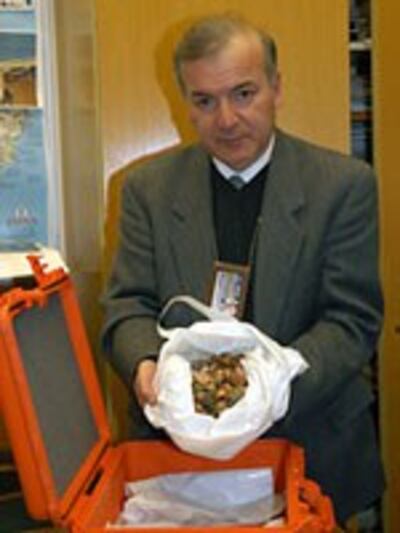
SEOUL—North Korea's number-two official, Kim Yong Nam, has arrived in the Chinese capital for meeting with his counterparts amid a continuing stalemate over six-party nuclear talks.
Kim Yong Nam, who is the second-in-command to supreme leader Kim Jong Il, will hold talks with Chinese President Hu Jintao and Premier Wen Jiabao, just days ahead of a three-country tour to the region by U.S. Secretary of State Colin Powell, which begins Friday.
A third round of talks—which involve North and South Korea, the United States, Japan, China, and Russia—ended inconclusively in August, and North Korea has refused to commit to a fourth. Analysts believe Pyongyang is stalling until after the U.S. presidential elections in November.
Pyongyang seems to back Kerry
Official North Korean media have come out with a string of statements that specifically attack President George W. Bush’s administration in recent days, apparently hinting at greater hopes for progress on halting Pyongyang's nuclear weapons program under a U.S. administration headed by presidential challenger Sen. John Kerry.
"The South Korean authorities' maneuver to build nuclear-powered submarines indisputably proves that the peaceful use of nuclear programs that they are talking about is a lie."
As Kim Yong Nam arrived in Beijing, official North Korean media shifted focus to what they call South Korea’s nuclear ambitions.
"The South Korean authorities' maneuver to build nuclear-powered submarines indisputably proves that the peaceful use of nuclear programs that they are talking about is a lie and the nuclear development that they have been secretly promoting over the past 20 years is aimed at becoming armed with nuclear weapons," an official media commentary said.
"This completely runs counter to the joint declaration on denuclearization of the Korean Peninsula, which the North and South agreed on and faithfully promised before the nation," said the commentary, also carried by official broadcaster KCBS.
South Korea just experimenting
International Atomic Energy Authority (IAEA) inspectors visited the country earlier this month but said they were satisfied with what they found there.
"South Korean activities are simply experiments, while North Korea has a fully fledged re-processing process," IAEA chief Mohamed ElBaradei said following his trip. "I am getting full cooperation and transparency from the South Korean government, but the North has moved out of the nonproliferation regime over two years ago."
"I am getting full cooperation and transparency from the South Korean government, but the North has moved out of the nonproliferation regime over two years ago."
Fears of U.S. aggression
Seoul opposes bringing its own nuclear issue to the six-way talks.
The nuclear standoff began in October 2002 when the United States accused North Korea of operating a nuclear weapons program based on enriched uranium, in violation of a 1994 agreement.
Pyongyang has denied running the uranium-based program but has admitted restarting its plutonium program, citing fears of a pre-emptive strike by the United States.
Chinese leaders are expected to use the meeting with Kim Yong Nam to press the North to resume six-way talks.
